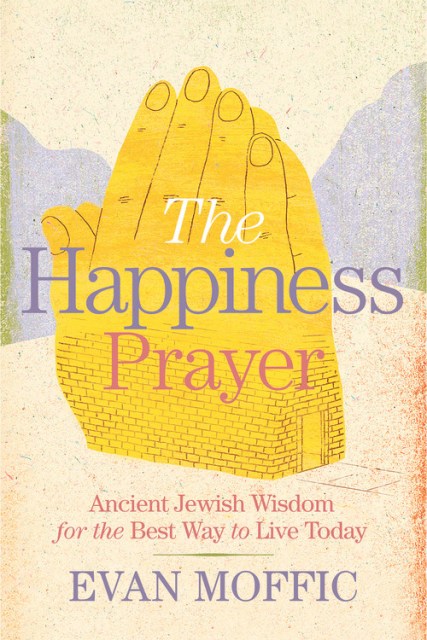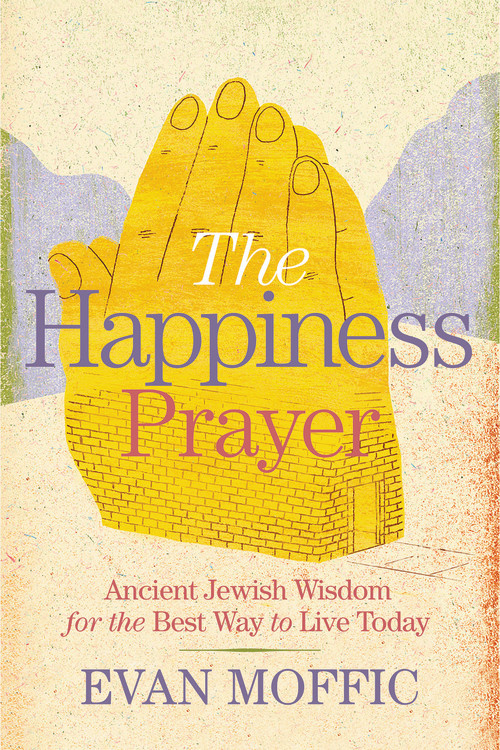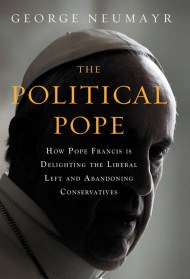By clicking “Accept,” you agree to the use of cookies and similar technologies on your device as set forth in our Cookie Policy and our Privacy Policy. Please note that certain cookies are essential for this website to function properly and do not require user consent to be deployed.
The Happiness Prayer
Ancient Jewish Wisdom for the Best Way to Live Today
Contributors
By Evan Moffic
Formats and Prices
- On Sale
- Sep 12, 2017
- Page Count
- 208 pages
- Publisher
- Center Street
- ISBN-13
- 9781478918066
Price
$34.00Price
$44.00 CADFormat
Format:
- Hardcover $34.00 $44.00 CAD
- ebook $13.99 $17.99 CAD
This item is a preorder. Your payment method will be charged immediately, and the product is expected to ship on or around September 12, 2017. This date is subject to change due to shipping delays beyond our control.
Buy from Other Retailers:
What if we had a clear path to follow when life disappointed us? What if we had a time-tested guide for a life of deeper meaning and happiness? That is what Rabbi Moffic discovered in an ancient Jewish prayer.
Based on ten practices any person can follow, the prayer has helped thousands of people-couples, teenagers, empty nesters struggling with loss, divorce, and ruptured relationships-find renewed meaning and purpose in their lives.
Moffic discovered the power of the prayer when he was called to become the youngest rabbi to lead a large US synagogue at just thirty years of age. The prayer became his guidepost, providing him with the wisdom to lead beyond his years. By incorporating the power of this prayer into his life and using it to guide his congregation and community, he became known as “the smiling rabbi.”
In the tradition of Rabbi Harold Kushner, Rabbi Evan Moffic opens up the Jewish wisdom tradition with insights for today. Drawing from interactions with thousands of congregants, as well as his own experience; relating stories of real people; providing accessible commentary from contemporary psychologists; and sprinkling in warm humor, this rabbi of a new generation reveals the means and meaning of joyous living that will appeal to everyone.
-
"Spiritual wisdom meets positive psychology, showing that the examined life is not an unhappy one."Adam Grant, New York Times bestselling author of Originals and Give and Take, and coauthor of Option B
-
"I wish that every Christian I know could sit around a table with Rabbi Moffic and his wife, Ari-also a rabbi. My husband, Aaron, and I have treasured the time we've spent around the table with them-they're wise and kind and funny, and the depth and richness of their faith bleeds into every conversation."Shauna Niequist, bestselling author
-
"One of our truly thoughtful and charismatic young leaders, Evan Moffic provides in captivating prose the wisdom and comfort of Jewish teachings for Jews and Gentile alike."David Ellenson, Chancellor of the Hebrew Union College
-
"Rabbi Moffic makes Judaism relevant to our daily lives. He inspires us to view ethical values through an inclusive and universal lens encouraging us to find acceptance, joy, and happiness in everything we do."Jason Brown, Olympic figure skater
-
"With sensitivity and insight, Rabbi Evan Moffic offers ancient wisdom to give us meaning and mooring amidst the challenges of our daily lives."Rabbi David Stern
-
"A much needed reminder - in a culture of seeking - that happiness can be a return to something ancient; Evan Moffic's insights and humanity fill the pages of THE HAPPINESS PRAYER, shining beauty and affirmation on the wisdom of a 2000-year-old prayer, and making it accessible to anyone yearning for a more meaningful life."Dan Ain, founder of "Because Jewish" and former Rabbi in Residence at 92Y
-
"Rabbi Evan Moffic masterfully invokes ancient Jewish wisdom to help us find happiness in our modern world."p.p1 {margin: 0.0px 0.0px 0.0px 0.0px; font: 12.0px 'Times New Roman'}Dr. Tal Ben Shahar, author of New York Times bestseller Happier: Learn the Secrets to Daily Joy and Lasting Fulfillment
-
"Rabbi Moffic captures a primary contemporary pursuit - happiness - and refracts it through anecdotes, rabbinic wisdom and popular culture to remind us that that the path to happiness is right before us at all times. Its wisdom is like the prize inside of a box of crackerjacks - a simple pleasure."Rabbi Lori Shapiro, The Open Temple
-
"A book about prayer, kindness, and happiness -- a perfect trilogy. Follow Rabbi Moffic's suggestions, and you will not only be a blessing in other people's lives, you will be a blessing in your own as well."Rabbi Joseph Telushkin, author of Jewish Literacy, Words that Hurt, Words that Heal
-
"Want to know where to put your energy for a life that has maximal meaning, connection, and opportunities to grow as a person? Read THE HAPPINESS PRAYER. Rabbi Evan Moffic masterfully takes us on a powerful journey through the wisdom of our tradition and the complexities of the human heart. This happiness isn't about quick fixes and instant gratification--rather, it's the recipe for something much more long-lasting and sustaining."Rabbi Danya Ruttenberg, author of Nurture the Wow: Finding Spirituality in The Frustration, Boredom Tears, Poop, Desperation, Wonder and Radical Amazement of Parenting
-
"The longer I live, and the more I'm faced with the inescapable reality of pain in life, the more I search for and surround myself with people who exude joy. Men and women who know how to dance in the rain. My friend, Rabbi Evan Moffic, is a shining example. It's impossible to be in a bad mood when I'm with him. And this book delivers that joyful spirit directly to you."Michele Cushatt, author of I Am: A 60-day Journey To Knowing Who You Are Because of Who He is
-
"[T]he wisdom packed into THE HAPPINESS PRAYER could last you a lifetime."Barbara Mahany, Chicago Tribune
Newsletter Signup
By clicking ‘Sign Up,’ I acknowledge that I have read and agree to Hachette Book Group’s Privacy Policy and Terms of Use







